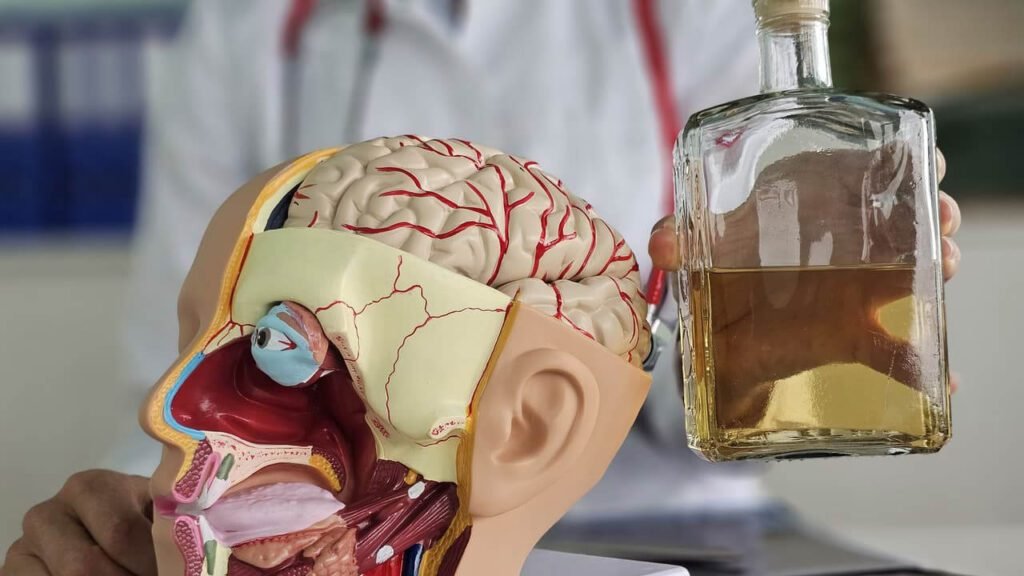Alcohol has long been a part of social life, celebrated in gatherings, dinners, and celebrations. Many people assume that light or moderate drinking is harmless and may even have health benefits, particularly for the heart and brain. However, emerging research has revealed a troubling truth: there is no completely safe level of alcohol consumption when it comes to brain health. Even light drinking may increase the risk of dementia.
This discovery challenges decades of belief that moderate alcohol intake could be beneficial or neutral for cognitive function. It underscores the need to rethink our relationship with alcohol and highlights the importance of awareness about its long-term effects on the brain.
Understanding Alcohol and Its Effects on the Brain
Alcohol is a central nervous system depressant, meaning it slows down brain activity. When consumed, it affects various neurotransmitters, which are the chemical messengers in the brain. This interference can alter mood, judgment, memory, and motor coordination.

Even at low levels, alcohol has a subtle yet cumulative impact on the brain. Regular consumption over time can lead to the shrinking of certain brain regions, particularly the hippocampus, which is essential for memory formation and learning. Light drinking may not lead to obvious short-term consequences, but the long-term effects can quietly increase vulnerability to cognitive decline and dementia.
Breaking the Myth of “Safe” Drinking
For years, the concept of “safe drinking” suggested that moderate alcohol intake could be harmless or even protective. The so-called “J-shaped curve” was widely referenced, indicating that light to moderate drinkers were supposedly at lower risk of dementia compared to heavy drinkers or abstainers. This notion encouraged many people to continue drinking small amounts, believing it was beneficial for their overall health.

Recent findings, however, have overturned this belief. Studies now suggest that the risk of dementia increases with any level of alcohol consumption. There is no threshold at which drinking can be considered completely safe for the brain. Even just one to three drinks per week can subtly contribute to cognitive decline over time. The idea that alcohol has protective effects on the brain appears to be a myth, leaving only risks behind.
How Alcohol Increases Dementia Risk
Alcohol affects the brain in multiple ways that can elevate the risk of dementia:
- Brain Cell Damage: Alcohol can directly damage neurons, particularly in areas responsible for memory and learning. Repeated exposure to alcohol slows the growth of new brain cells and can lead to the shrinking of critical brain regions.
- Nutrient Depletion: Chronic alcohol consumption depletes essential vitamins, such as thiamine and other B-vitamins, which are crucial for healthy brain function. Deficiencies in these nutrients can cause neurological problems and exacerbate cognitive decline.
- Inflammation: Alcohol triggers inflammation in the brain, which can interfere with normal communication between neurons. Chronic inflammation is a known contributor to many forms of dementia, including Alzheimer’s disease.
- Oxidative Stress: Alcohol increases oxidative stress in brain cells, leading to cellular damage over time. This stress accelerates aging in the brain and can impair cognitive abilities.
- Disruption of Sleep Patterns: Even light drinking can affect sleep quality, reducing restorative deep sleep. Poor sleep is strongly associated with memory problems and increased dementia risk over the long term.
The combined effect of these mechanisms illustrates why there is no truly safe amount of alcohol for the brain. What may feel like harmless social drinking can quietly undermine long-term cognitive health.
Dementia: A Growing Global Concern
Dementia is a progressive neurological disorder that affects millions of people worldwide. It is characterized by memory loss, confusion, difficulty with reasoning, and changes in behavior and personality. Alzheimer’s disease is the most common form of dementia, but other types, such as vascular dementia and Lewy body dementia, are also prevalent.
The global incidence of dementia is rising rapidly, and research indicates that lifestyle factors, including alcohol consumption, play a significant role in its development. Reducing alcohol intake has emerged as a potentially powerful preventive measure, alongside other lifestyle choices such as maintaining a healthy diet, regular exercise, and mental stimulation.

Social Norms and the Challenge of Cutting Back
One reason light drinking remains common is the strong social and cultural acceptance of alcohol. Many people drink to relax after work, socialize with friends, or celebrate milestones. While moderation is often promoted, the line between moderate and harmful drinking is not always clear, especially when considering long-term brain health.
Cutting back on alcohol, even slightly, can feel socially challenging. However, understanding the hidden risks of even light drinking may help motivate people to reconsider their habits. Social norms are gradually shifting, and awareness campaigns are encouraging people to view alcohol not as harmless fun but as a potential threat to long-term cognitive health.
Alternatives to Alcohol for Relaxation and Socializing
Fortunately, there are many ways to unwind and socialize without relying on alcohol. Some alternatives include:
- Exercise: Physical activity improves mood, reduces stress, and promotes brain health by increasing blood flow and stimulating the growth of new neurons.
- Mindfulness and Meditation: Practices such as meditation, yoga, or deep breathing can reduce stress and anxiety, serving as a natural alternative to alcohol.
- Non-Alcoholic Beverages: Increasingly, there are sophisticated non-alcoholic drinks that mimic the taste and experience of traditional cocktails and beers, allowing social participation without alcohol.
- Creative Hobbies: Engaging in creative activities like painting, music, or writing can provide relaxation and mental stimulation, which support cognitive health.
By replacing alcohol with healthier options, individuals can protect their brain function while still enjoying social and recreational activities.
Public Health Implications
The revelation that even light drinking increases dementia risk has broad public health implications. Governments, health organizations, and medical professionals may need to update guidelines and recommendations regarding alcohol consumption.
Current public health campaigns often focus on preventing heavy drinking and alcohol-related accidents. However, this new evidence suggests that even small amounts of alcohol can have long-term consequences on brain health. Increasing awareness and promoting healthier lifestyle choices can help reduce dementia rates and improve overall cognitive health in the population.

Early Intervention and Prevention
Preventing dementia starts long before symptoms appear. Lifestyle factors, including diet, exercise, mental engagement, and alcohol consumption, play crucial roles in shaping long-term brain health. By understanding that no amount of alcohol is entirely safe, individuals can take proactive steps to protect their memory and cognitive function.
Reducing or eliminating alcohol from daily life, combined with other healthy habits, may significantly lower the risk of developing dementia later in life. Early intervention, even for those who already drink lightly, can still provide meaningful benefits.
Final Thoughts
The belief that light drinking is harmless has persisted for years, but new evidence strongly contradicts this assumption. Alcohol, even in small amounts, contributes to brain atrophy, inflammation, nutrient depletion, and cognitive decline. The risks are clear: there is no safe sip when it comes to dementia.
Awareness is key. Individuals should evaluate their drinking habits and consider cutting back or eliminating alcohol entirely to safeguard their long-term cognitive health. By making informed choices, it is possible to enjoy social life and relaxation while protecting the brain from the silent but serious threat of dementia.
In conclusion, while alcohol may offer temporary enjoyment or relaxation, its long-term effects on the brain are significant. Protecting mental health requires understanding the risks and taking proactive steps to minimize exposure. No level of alcohol consumption is risk-free, and even light drinking should be approached with caution for the sake of lifelong cognitive well-being.
Do follow UAE Stories on Instagram
Read Next – E& Enterprise Sets Unmatched Standards for CX Excellence Across UAE












